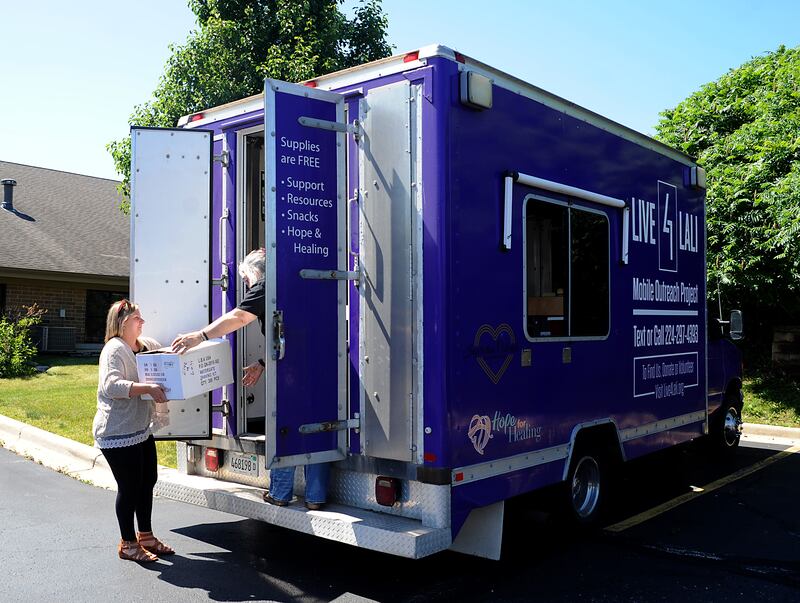A Crystal Lake mother whose son died from a fentanyl overdose said a recent order issued by President Donald Trump to restrict federal funds from being spent on so-called harm reduction will only result in more drug-related deaths.
“We are going backwards, basically,” Brenda Napholz said. “Overdose deaths have significantly decreased since organizations like [Arlington Heights-based] Live4Lali have been able to serve so many people and create connections of trust.”
Trump issued an executive order in July called “Ending Crime and Disorder on America’s Streets.”
That means an end to federal funding for harm-reduction efforts such as distributing kits to test for the presence of deadly fentanyl or providing clean needles to intravenous drug users. Advocates say such efforts lessen health risks and stigma for users; critics say those measures encourage drug abuse and contribute to lawlessness.
According to a letter dated July 29, from the federal Substance Abuse and Mental Health Services Administration, harm-reduction items and services no longer allowed to be paid for with federal funds include:
- pipes or other supplies for safer smoking kits
- syringes or needles used to inject illicit drugs or any other drug paraphernalia
- sterile water, saline or ascorbic acid used to facilitate drug use or any other supplies that promote or facilitate drug use
- supervised consumption sites, also known as “overdose prevention centers”
Trump directed the Department of Health and Human Services Secretary Robert F. Kennedy Jr. to take action to “ensure that discretionary grants” issued by the SMHSA for substance use disorder prevention, treatment and recovery fund “evidence-based programs.”
The president ordered that federal funding “not fund programs that fail to achieve adequate outcomes, including so-called ‘harm-reduction’ or ‘safe-consumption’ efforts that only facilitate illegal drug use.”
The purpose of the order is to address “endemic vagrancy, disorderly behavior, sudden confrontations and violent attacks [that] have made our cities unsafe,” according to the executive order.
These attacks are by people who are homeless, many of whom have mental health issues and are addicted to drugs, according to the order.
:quality(70)/cloudfront-us-east-1.images.arcpublishing.com/shawmedia/FYGRHBHWOBGEJJFB4MUWPJRZMA.jpg)
Naloxone, which can reverse the effects of opioid overdoses, and fentanyl test strips are among items still allowed to be paid for with federal funding, according to the SAMHSA letter.
But Laura Fry, executive director of Live4Lali, fears those soon will be on the no-funding list.
Live4Lali’s mission is to help people with mental health and substance-use challenges. The organization strives to reduce stigma and prevent substance use disorder among individuals, families and communities, and to minimize the overall health, legal and social harms associated with substance use, according to the website.
Peer support specialists, many in recovery themselves, ensure those with a substance use or abuse disorder, who continue using drugs, are at least doing it safely.
“They are helping keep people alive,” Fry said.
Napholz said Live4Lali helps take away the fear, shame and stigma that people with substance use disorder feel. When those feelings are removed, a person is more likely to come forward and ask for help to recover, or at least ask for fentanyl test strips, clean needles and syringes so they are using drugs safely.
For example, a pregnant woman with a substance use disorder is still going to use, Napholz said. Nobody wants to see that happen, but to help protect the baby she is carrying, groups like Live4Lali can make sure she is using clean needles and syringes, Napholz said.
:quality(70)/cloudfront-us-east-1.images.arcpublishing.com/shawmedia/W5HLBVRF2RHO5HJFSDMZMV5D2Y.jpg)
Napholz, who founded the BREAK teen center in Crystal Lake, wishes her 27-year-old son, Paul, who died from a fentanyl overdose in 2019, had come to her when he relapsed. But she believes it was because of the stigma around substance use that he did not.
“The drug supply is a moving target and unpredictable, with more and more contaminants in the drugs people use,” Napholz said. “Organizations like Live4Lali stay on top of those trends, [and] provide education and alternatives to keep people safe. This increases the possibility of getting people into treatment and with supports to help them in recovery. It goes without saying that we will see a rise in overdose deaths, hospitalizations and long-term treatment for preventable diseases.”
:quality(70)/cloudfront-us-east-1.images.arcpublishing.com/shawmedia/DLHAI4237NFJ7L3U2UPLSMY65Y.jpg)
Fry said Live4Lali, which opened an office in Woodstock earlier this year, spends about $100,000 in federal funding annually to buy harm-reduction supplies. Not being able to use federal funding on the supplies is going to create a challenge, she said.
Live4Lali was founded in 2009 by a family whose son died in 2008 of a heroin overdose.
“He died cold, scared and alone,” the organization said on its website.
Through its Mobile Outreach Program, peer recovery support specialists travel throughout the suburbs and beyond, including in McHenry, Kane, Lake, Cook, DeKalb and Winnebago counties. The organization’s purple van is loaded with harm-reduction supplies, including clean needles, syringes and pipes, fentanyl test strips, and naloxone.
In McHenry County, Fry said Live4Lali serves 400 people each month. It is the second-largest group next to Cook County, she said.
Providing harm-reduction supplies is important on many levels, Fry said.
“We are helping people find wellness, which will then make them better citizens,” Fry said. “We are stopping the spread of disease, blood-borne pathogens like HIV. We are just being a friend in the storm to people who typically are invisible to most of us.”
With hopes to raise $80,000 for harm-reduction supplies, Live4Lali is hosting a Masquerade Gala fundraiser from 4 to 8 p.m. Oct. 19 at Chevy Chase Country Club in Wheeling. Tickets and more information are available by emailing L4LGALA25@givesmart.com.
